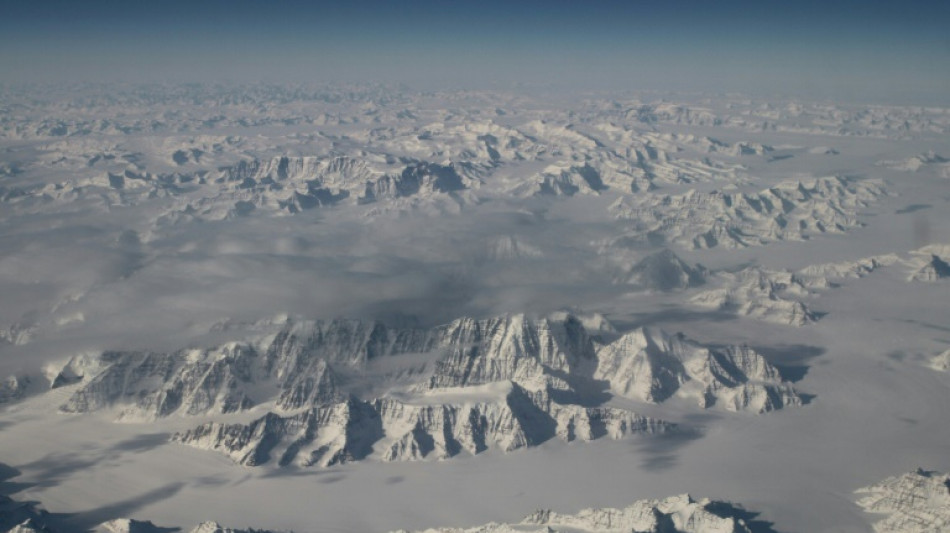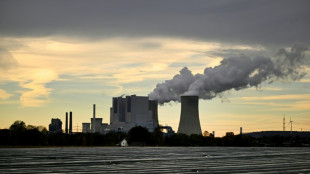
-
 LA mayor urges US to reassure visiting World Cup fans
LA mayor urges US to reassure visiting World Cup fans
-
Madrid condemned to Champions League play-off after Benfica loss

-
 Meta shares jump on strong earnings report
Meta shares jump on strong earnings report
-
Haaland ends barren run as Man City reach Champions League last 16

-
 PSG and Newcastle drop into Champions League play-offs after stalemate
PSG and Newcastle drop into Champions League play-offs after stalemate
-
Salah ends drought as Liverpool hit Qarabag for six to reach Champions League last 16

-
 Barca rout Copenhagen to reach Champions League last 16
Barca rout Copenhagen to reach Champions League last 16
-
Arsenal complete Champions League clean sweep for top spot

-
 Kolo Muani and Solanke send Spurs into Champions League last 16
Kolo Muani and Solanke send Spurs into Champions League last 16
-
Bayern inflict Kane-ful Champions League defeat on PSV

-
 Pedro double fires Chelsea into Champions League last 16, dumps out Napoli
Pedro double fires Chelsea into Champions League last 16, dumps out Napoli
-
US stocks move sideways, shruggging off low-key Fed meeting

-
 US capital Washington under fire after massive sewage leak
US capital Washington under fire after massive sewage leak
-
Anti-immigration protesters force climbdown in Sundance documentary

-
 US ambassador says no ICE patrols at Winter Olympics
US ambassador says no ICE patrols at Winter Olympics
-
Norway's Kristoffersen wins Schladming slalom

-
 Springsteen releases fiery ode to Minneapolis shooting victims
Springsteen releases fiery ode to Minneapolis shooting victims
-
Brady latest to blast Belichick Hall of Fame snub

-
 Trump battles Minneapolis shooting fallout as agents put on leave
Trump battles Minneapolis shooting fallout as agents put on leave
-
SpaceX eyes IPO timed to planet alignment and Musk birthday: report

-
 White House, Slovakia deny report on Trump's mental state
White House, Slovakia deny report on Trump's mental state
-
Iran vows to resist any US attack, insists ready for nuclear deal

-
 Colombia leader offers talks to end trade war with Ecuador
Colombia leader offers talks to end trade war with Ecuador
-
Former Masters champ Reed returning to PGA Tour from LIV

-
 US Fed holds interest rates steady, defying Trump pressure
US Fed holds interest rates steady, defying Trump pressure
-
Norway's McGrath tops first leg of Schladming slalom

-
 Iraq PM candidate Maliki denounces Trump's 'blatant' interference
Iraq PM candidate Maliki denounces Trump's 'blatant' interference
-
Neil Young gifts music to Greenland residents for stress relief

-
 Rubio upbeat on Venezuela cooperation but wields stick
Rubio upbeat on Venezuela cooperation but wields stick
-
'No. 1 fan': Rapper Minaj backs Trump

-
 Fear in Sicilian town as vast landslide risks widening
Fear in Sicilian town as vast landslide risks widening
-
'Forced disappearance' probe opened against Colombian cycling star Herrera

-
 Seifert, Santner give New Zealand consolation T20 win over India
Seifert, Santner give New Zealand consolation T20 win over India
-
King Charles III warns world 'going backwards' in climate fight

-
 Minneapolis activists track Trump's immigration enforcers
Minneapolis activists track Trump's immigration enforcers
-
Court orders Dutch to protect Caribbean island from climate change

-
 Sterling agrees Chelsea exit after troubled spell
Sterling agrees Chelsea exit after troubled spell
-
Rules-based trade with US is 'over': Canada central bank head

-
 Lucas Paqueta signs for Flamengo in record South American deal
Lucas Paqueta signs for Flamengo in record South American deal
-
Holocaust survivor urges German MPs to tackle resurgent antisemitism

-
 'Extraordinary' trove of ancient species found in China quarry
'Extraordinary' trove of ancient species found in China quarry
-
Villa's Tielemans ruled out for up to 10 weeks

-
 Google unveils AI tool probing mysteries of human genome
Google unveils AI tool probing mysteries of human genome
-
UK proposes to let websites refuse Google AI search

-
 'I wanted to die': survivors recount Mozambique flood terror
'I wanted to die': survivors recount Mozambique flood terror
-
Trump issues fierce warning to Minneapolis mayor over immigration

-
 Anglican church's first female leader confirmed at London service
Anglican church's first female leader confirmed at London service
-
Germany cuts growth forecast as recovery slower than hoped

-
 Amazon to cut 16,000 jobs worldwide
Amazon to cut 16,000 jobs worldwide
-
One dead, five injured in clashes between Colombia football fans


Dire sea level rise likely even in a 1.5C world: study
Rising seas will severely test humanity's resilience in the second half of the 21st century and beyond, even if nations defy the odds and cap global warming at the ambitious 1.5 degrees Celsius target, researchers said Tuesday.
The pace at which global oceans are rising has doubled in three decades, and on current trends will double again by 2100 to about one centimetre per year, they reported in a study.
"Limiting global warming to 1.5C would be a major achievement" and avoid many dire climate impacts, lead author Chris Stokes, a professor at Durham University in England, told AFP.
"But even if this target is met," he added, "sea level rise is likely to accelerate to rates that are very difficult to adapt to."
Absent protective measures such as sea walls, an additional 20 centimetres (7.8 inches) of sea level rise -- the width of a letter-size sheet of paper -- by 2050 would cause some $1 trillion in flood damage annually in the world's 136 largest coastal cities, earlier research has shown.
Some 230 million people live on land within one metre (3.2 feet) of sea level, and more than a billion reside within 10 metres.
Sea level rise is driven in roughly equal measure by the disintegration of ice sheets and mountain glaciers, as well as the expansion of warming oceans, which absorb more than 90 percent of the excess heat due to climate change.
Averaged across 20 years, Earth's surface temperature is currently 1.2C above pre-industrial levels, already enough to lift the ocean watermark by several metres over the coming centuries, Stokes and colleagues noted in the journal Communications Earth & Environment.
The world is on track to see temperatures rise 2.7C above that benchmark by the end of the century.
- Tipping points -
In a review of scientific literature since the last major climate assessment by the UN-mandated Intergovernmental Panel on Climate Change (IPCC), Stokes and his team focused on the growing contribution of ice sheets to rising seas.
In 2021, the IPCC projected "likely" sea level rise of 40 to 80 centimetres by 2100, depending on how how quickly humanity draws down greenhouse gas emissions, but left ice sheets out of their calculations due to uncertainty.
The picture has become alarmingly more clear since then.
"We are probably heading for the higher numbers within that range, possibly higher," said Stokes.
The scientist and his team looked at three baskets of evidence, starting with what has been observed and measured to date.
Satellite data has revealed that ice sheets with enough frozen water to lift oceans some 65 metres are far more sensitive to climate change than previously suspected.
The amount of ice melting or breaking off into the ocean from Greenland and West Antarctica, now averaging about 400 billion tonnes a year, has quadrupled over the last three decades, eclipsing runoff from mountain glaciers.
Estimates of how much global warming it would take to push dwindling ice sheets past a point of no return, known as tipping points, have also shifted.
"We used to think that Greenland wouldn't do anything until the world warmed 3C," said Stokes. "Now the consensus for tipping points for Greenland and West Antarctica is about 1.5C."
The 2015 Paris climate treaty calls for capping global warming at "well below" 2C, and 1.5C if possible.
The scientists also looked at fresh evidence from the three most recent periods in Earth's history with comparable temperatures and atmospheric levels of CO2, the main driver of global warming.
About 125,000 years ago during the previous "interglacial" between ice ages, sea levels were two to nine metres higher than today despite a slightly lower average global temperature and significantly less CO2 in the air -- 287 parts per million, compared to 424 ppm today.
A slightly warmer period 400,000 ago with CO2 concentrations at about 286 ppm saw oceans 6-to-13 metres higher.
And if we go back to the last moment in Earth's history with CO2 levels like today, some three million years ago, sea levels were 10-to-20 metres higher.
Finally, scientists reviewed recent projections of how ice sheets will behave in the future.
"If you want to slow sea level rise from ice sheets, you clearly have to cool back from present-day temperatures," Stokes told AFP.
"To slow sea level rise from ice sheets to a manageable level requires a long-term temperature goal that is close to +1C, or possibly lower."
G.Frei--VB



